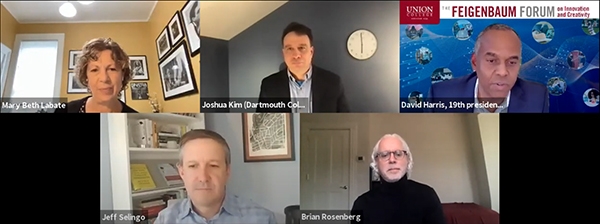In the past few years, higher education has faced myriad challenges, including an outdated financial model, demographic trends that will dramatically reduce the number of college-age students over the next decade and a shift to more STEM-based learning at the expense of the humanities.
Then in early March 2020, the World Health Organization declared the coronavirus outbreak a pandemic. With little time to prepare, colleges and universities abandoned their campuses and shifted to remote learning. Most were in uncharted waters.
“Arguably no sector has been required to exhibit more innovation and creativity than residential higher education,” President David R. Harris said in his opening remarks Tuesday night to kick off the sixth annual Feigenbaum Forum on Innovation and Creativity. The topic was “How Higher Education Adapted to the Pandemic: Building on Lessons Learned from a Year in COVID.”
The forum, held virtually this year because of the pandemic, featured an engaging conversation moderated by President Harris between four leaders in higher education.
Over the course of 90 minutes, the panel touched on what worked and what did not over the past 15 months, what colleges and universities learned from the experience and how liberal arts colleges will thrive going forward.
“In some ways, I think this has been one of the most creative periods in the history of American higher education,” said Jeff Selingo, special advisor for innovation and professor of practice at Arizona State University, whose latest book is “Who Gets In & Why: A Year Inside College Admissions.”
Selingo said the pandemic has allowed schools to transform previously sacrosanct processes such as the academic calendar, discover new ways of serving students, and adapt to having many faculty and staff work remotely.
“The question for me is, what snaps back?” he said. “One fear I have is that in this desire to return to some sense of normalcy, come fall, all that we’ll have learned over the last 15 months will be lost.”
Mary Beth Labate is the former president of the Commission on Independent Colleges and Universities (CICU), a statewide association representing the public policy interests of the chief executives of more than 100 independent colleges and universities in New York state.
In February, with the pandemic in its infancy, higher education had the foresight to bring students abroad home.
“I want to give a shout out to higher education,” said Labate, now a senior advisor at Brown & Weinraub. “We understood that something big was coming. We reacted a little more quickly than a lot of industries.”
Sports leagues and higher education were among the first industries to respond to the growing threat of the pandemic. The NBA suspended its season March 11. Harvard was among the first schools to shift to remote learning.
“Harvard sending everybody home; that reverberates,” said Brian Rosenberg, President in Residence at the Harvard Graduate School of Education and president emeritus of Macalester College, which he headed for 17 years. “The amount of innovating and adapting that colleges and universities did in a very short time was pretty remarkable. But I do wonder how much of that will stick.”
The panel discussed the impact of the pandemic on admissions, including the future of standardized test scores in determining whether a student is admitted. Many schools waived the requirement over the past year. Union is test optional. The group also talked about the role of faculty going forward.
Joshua Kim is the director of Online Programs and Strategy at the Dartmouth Center for the Advancement of Learning and Senior Scholar at Georgetown University. He said COVID both exacerbated and revealed structural inequalities in education.
For Kim, the biggest innovation was not academic continuity or remote learning. It was the pedagogy of care, in which schools understood where its students were living and the challenges they faced.
“We were all in on getting our students through this incredibly difficult time,” Kim said. “We interacted with our students in a different way. I hope when we come back, we still think about the challenges our learners have, focus our energies on the learners with the least resources and the most complicated lives. If we can make it work for them, through universal design for learning and through other supports, it will work for everyone else.”
The Feigenbaum Foundation, created by brothers Armand V. Feigenbaum ’42 and Donald S. Feigenbaum ‘46, longtime benefactors to Union, supports the forum.
Acknowledged world leaders in systems engineering and total quality control, the brothers founded General Systems Co., a Pittsfield, Mass.-based international systems engineering firm that designs and helps implement operational systems for corporations and governments worldwide. Armand died November 2014; Donald, March 2013.
For more than a dozen years, the brothers hosted the Feigenbaum Forum, a gathering on campus at which academicians discussed characteristics of a new generation of leaders and how better to integrate liberal arts and other studies. The current series builds on this event by bringing in prominent speakers who have revolutionized their fields of endeavor through contributions deemed innovative and creative.
